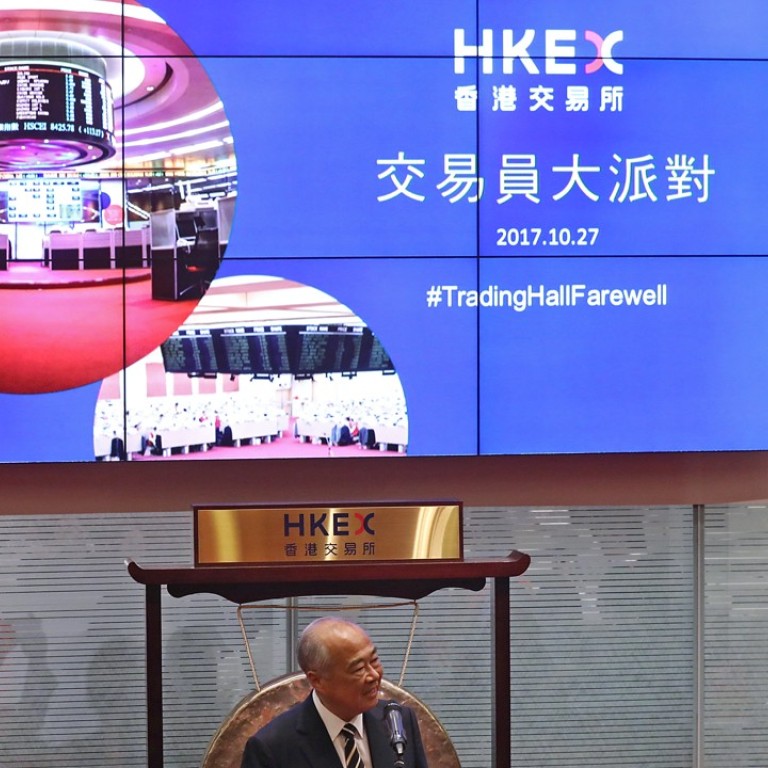
Update | HK stocks end flat after China eases financial industry access for foreign investors
Shares of mainland Chinese banks and insurers diverge, after China said it will foreigners to own a majority stake in joint ventures with domestic securities firms and life insurance companies
Hong Kong stocks were little changed on Friday, but posted the biggest weekly gain in five weeks, as Chinese banks fell and insurers rose after China said it will substantially ease foreign access to its financial industry.
The Hang Seng Index edged down 0.1 per cent, or 15.65 points, to 29,120.92 on Friday. The benchmark index made a weekly gain of 1.8 per cent, or 517.1 points, the best weekly performance since October 9, as it hit fresh 10-year highs twice this week.
The Hang Seng China Enterprises Index, known as the H-share index, was up 0.01 per cent, or 1.27 points, at 11,745.81. Turnover stood at HK$110.45 billion.
Foreign companies will be allowed to own a majority stake in joint ventures with mainland Chinese securities firms and life insurance companies, China’s deputy finance minister Zhu Guangyao said on Friday.
The country will open the country’s financial services sector to foreign players almost entirely in the next five years, Zhu said.
Shares of mainland Chinese banks and insurers diverged on the back of the news, with the former falling broadly and the latter advancing.
Industrial and Commercial Bank of China declined 1.1 per cent, China Construction Bank dropped 0.7 per cent, and Bank of China fell 0.8 per cent.
“The news was used as an excuse for investors to sell Chinese bank shares,” said Castor Pang Wai-sun, head of research at Core Pacific-Yamaichi. “Because it will be hard for foreign banks to outperform in the market anyway. HSBC, Citi and Bank of East Asia already have a presence in China, but they are not doing well in the market.”

The Shanghai Composite Index gained 1.8 per cent, or 60.93 points, for this week.
Ping An Insurance advanced 3.2 per cent, contributing the most gains to the Hang Seng Index. New China Life Insurance jumped 5.3 per cent, and China Life Insurance added 0.7 per cent.
The news was used as an excuse for investors to sell Chinese bank shares
Chinese internet giant Tencent fell 0.6 per cent. Shares of the firm have gained nearly 10 per cent since the beginning of this month, as expectations on its earnings release due next Wednesday grew.
A frenzy for new listings of so-called new economy shares on the city’s bourse continued on Friday, after e-book publisher China Literature surged almost 90 per cent during its debut on Wednesday.
Razer, a gaming device maker backed by Intel and Hong Kong billionaire Li Ka-shing, saw its initial public offering (IPO) tranche 290 times oversubscribed, making it another red-hot new listing after China Literature.
Yixin Group, a Chinese online car retailing platform invested by Tencent, has already locked in more than HK$382 billion ahead of its scheduled debut trading on Thursday, valuing the IPO among the top 10 in Hong Kong history, according to preliminary results.
Apple supplier AAC Technologies rose 3.9 per cent, hitting an all-time high after posting a 42 per cent year-on-year jump in net profit for the first nine months of this year.
Smartphone camera lens maker Sunny Optical Technology also rose 0.8 per cent, after its October shipments for camera lens grew 39 per cent from the same period last year.
Stocks on the mainland Chinese markets rose. The Shanghai Composite added 0.1 per cent, or 4.88 points, to 3,432.67, while the CSI 300 Index, which tracks large companies listed in Shanghai and Shenzhen, gained 0.9 per cent to 4,111.91.
The Shenzhen Composite Index rose 0.5 per cent to 2,039.17, and the start-up board index ChiNext increased 0.9 per cent to 1,900.63.


